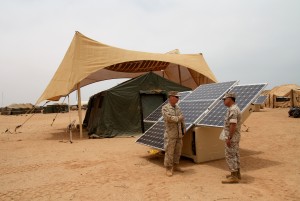 According to the Pentagon, the military’s reliance on fossil fuels – and the vulnerabilities that accompany that reliance – could potentially pose a major national security issue. This potential threat has invigorated the Department of Defense (DoD) to lead on the issue by rebalancing energy security throughout the military. Satisfying growing concern for both operational energy and installation energy looks to be a challenge in the years to come.
According to the Pentagon, the military’s reliance on fossil fuels – and the vulnerabilities that accompany that reliance – could potentially pose a major national security issue. This potential threat has invigorated the Department of Defense (DoD) to lead on the issue by rebalancing energy security throughout the military. Satisfying growing concern for both operational energy and installation energy looks to be a challenge in the years to come.
Pentagon planners are responding accordingly by recognizing the critical role of energy in military operations and the potential vulnerabilities. The overarching mission is the preservation of operational capabilities at home and abroad – investments are a matter of national security, the military says, and not environmental idealism or party politics on greenhouse gas emissions. According to a leading Navy official, the goal is “saving lives… technology that reduces our consumption [and] energy sources that will provide more options down the road, [building] our readiness.”
As the single largest consumer of oil globally, the military is focused on reducing its operational energy. Convoys in theater, as many as 50% of which have been devoted to carrying petroleum alone, are vulnerable to roadside improvised explosive devices, which can result in major casualties. DoD’s most recent energy strategy to mitigate the security risk of over-reliance on oil and gas includes increasing energy efficiency, renewable fuel production and modernized equipment. For example, DoD has explored biofuel-blended jets, but subsequent criticism has focused on the high costs of these fuels.
To strengthen installation energy security against natural disasters and cyber attacks, the military has invested heavily in renewable power sources at its facilities. The Navy and Army have developed substantial solar and wind generation capabilities at their facilities as part of this effort. However, renewable energy resources met only 3.5 percent of Pentagon electricity demand as of 2014, a number that critics say offer little in the way of energy security.
The expense of energy to the military is far greater than most of us suspect. There is the basic cost of the fuel but it is the transportation that gets… Read more »
My approach to this topic is provided in excerpts from my national energy program (NEP) white paper https://www.ourenergypolicy.org/wp-content/uploads/2016/06/National-Energy-Program-white-paper-0501161.pdf as follows: Over 70% of the tonnage required… Read more »
As a veteran now serving in clean energy, my concern is the staggering amount of annual national budget and lifeblood that goes to the military to protect our oils interests… Read more »
The US Department of Defense, starting with Herbert W. Bush, began education and investments in energy efficiency, reducing energy loads, renewable electricity and renewable fuels. On the electricity front, the… Read more »
To make good policy and strategy, it is important to have good data and stick to the facts. Scott Sklar claims “More soldiers die in conveys [sic] bringing fuel, food… Read more »
This topic usually gets a very simplistic treatment rooted in ignorance about the physics of energy and false assumptions about the geopolitics of oil. The change the U.S. government and… Read more »